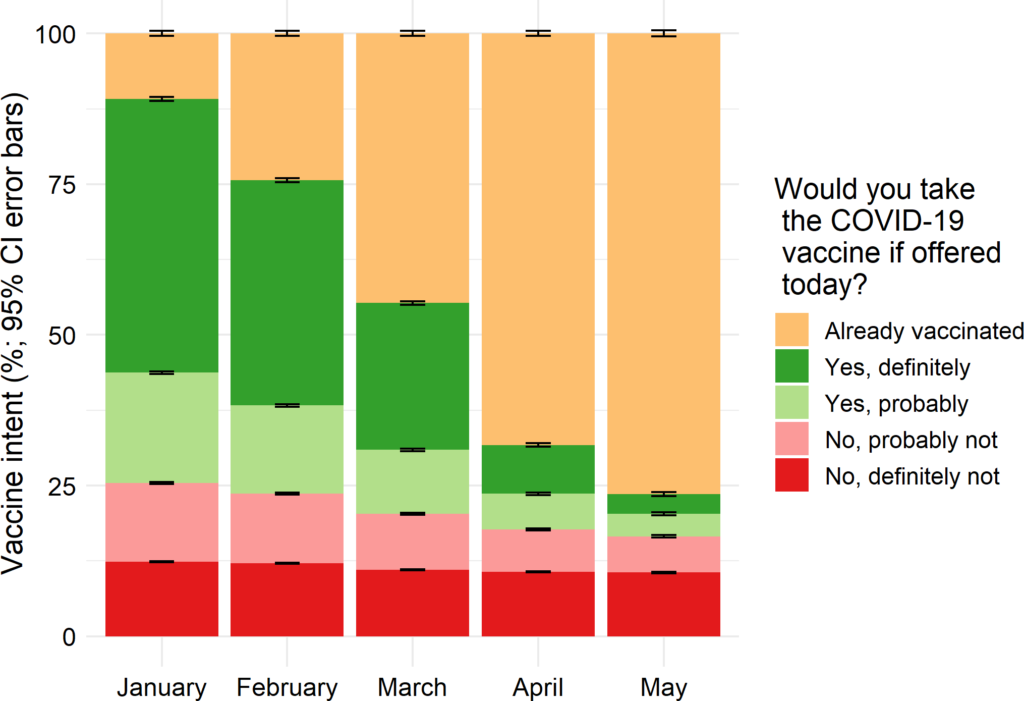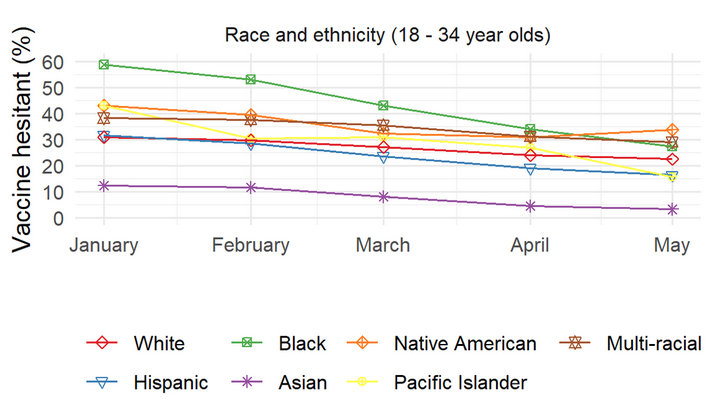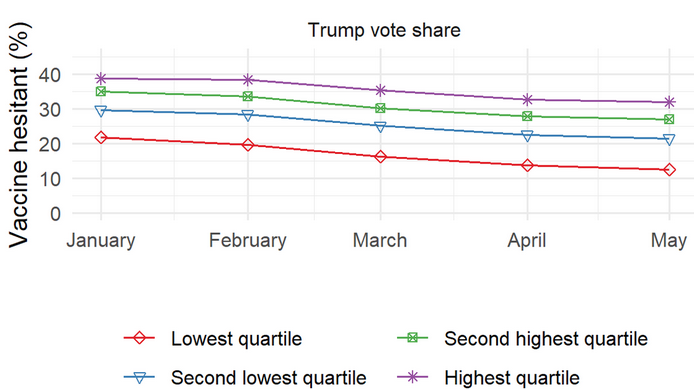
A massive online survey of more than 5 million Americans shows that political affiliation is a major factor influencing peoples’ decisions about the Covid-19 vaccines.
Researchers from Carnegie Mellon University (CMU) and the University of Pittsburgh, in partnership with CMU’s Delphi Group, culled and analyzed data on vaccine attitudes from a larger national Covid survey that Delphi runs in collaboration with Facebook Data for Good.
A total of 5,088,772 US adults responded between January and May 2021. Invitations to participate appeared at the top of Facebook users’ news feeds in early 2021. At the time, Covid vaccine programs were just rolling out.
Among other topics, the survey asked whether or not respondents would accept a Covid-19 vaccine if it were offered to them today. Those who answered “probably not” or “definitely not” were deemed “vaccine hesitant.”
The questionnaire included questions about race, age, education, health status, geographical location, political preferences, and more. The researchers published their findings last December in the journal PLoS ONE (King, W et al. PLoS ONE. 2021. 16(12): e0260731).
A total of 5,088,772 US adults responded between January and May 2021.Vaccine-hesitant individuals were generally younger, non-Asian, and held less than a 4-year college degree. They also tended to live in rural areas, and in counties with higher voting shares for Donald Trump.
Vaccine hesitancy was up over 25% at outset of the survey (95%CI, 25.3, 25.5), but it dropped to 16.6% (95% CI, 16.4, 16.7) by May 2021. There were relatively large decreases among Black, Pacific Islander, and Hispanic participants, and also among those who had not gone to college.
Within the cohort of vaccine-reluctant people several demographic, environmental, political, health, belief and behavioral characteristics stood out.
Vaccine-hesitant individuals were generally younger, non-Asian, and held less than a 4-year college degree. They also tended to live in rural areas, and in counties with higher voting shares for Donald Trump in the 2020 presidential election.
They tended to work outside the home, expressed that they weren’t worried about Covid, were less inclined to practice social distancing, and had not gotten a flu vaccine in the prior year.
Of those who said they would “definitely not” get vaccinated, not trusting the Covid vaccine (59.2%) and not trusting the government (51.2%) were the most frequently cited reasons. Roughly half reported a fear of side effects (49.2%) as the reason for not taking the shot.
Racial & Age Variables
The researchers saw significant differences in vaccine attitudes by race and age subgroups.
Intent to vaccinate also rose across all racial groups in the first six months of 2021. Respondents who identified as Black and Pacific Islander showed the largest shifts from hesitancy to acceptance. As of May, those two groups plus Hispanics and Asians all demonstrated less vaccine resistance than Whites.

The data showed an interesting convergence of racial and age factors over time. For instance, in May 2021 toward the end of the survey period, young Black adults under 35 years old were more hesitant than Whites in the same age group. That pattern was reversed in people 45 years and older, with older Whites showing greater reluctance than older Blacks.
“There have been racial disparities in every aspect of the pandemic, from how hard different communities have been hit by it to access to healthcare resources,” said Robin Mejia, special faculty at the CMU Dietrich College of Humanities and Social Sciences, and an author of the paper.

In a press release about the study, Meija said communities of color have experienced disproportionately higher rates of SARS-CoV-2 infection, Covid-related hospitalizations, and mortality throughout the pandemic.
When vaccines first became available, acceptance varied dramatically across racial and ethnic groups. To Mejia, the overall decline in hesitancy within higher-risk communities is encouraging.
Overall, hesitancy decreased by about one-third, from 25.4% in January to 16.6% in May. But those who strongly resisted vaccination at the outset tended to remain adamantly opposed even as time went on.
Politicizing Public Health
Participants from counties that supported Trump in 2020 showed a notably higher degree of vaccine hesitancy than those from counties with the fewest Trump supporters. This disparity grew wider during the study period.
From January through May, Mejia’s team identified a “dose-response relationship” between relative degree of local Trump support and Covid vaccine hesitancy. Even after controlling for potential confounding variables, those living in counties with the highest share of Trump 2020 votes were 44% more likely to be vaccine hesitant than those living in counties with the lowest level of support for the former president.

“This finding really highlights the politicization of public health recommendations,” said Wendy C. King, associate professor of epidemiology at the University of Pittsburgh.
Vaccines Aren’t Viewed Equally
Another interesting finding is that Covid vaccine hesitancy appears to be “a distinct phenomenon from general vaccine hesitancy among US adults.”
Only 14.7% of Covid vaccine resisters chose “not liking vaccines” in general, as a reason for avoiding the shots.
That said, the people who had not taken flu vaccines in the past were 3.3 times more likely to express reluctance toward the Covid vaccine.
Not surprisingly, people who reported that they were not intentionally avoiding contact with others (aka “social distancing”) were more likely to be vaccine hesitant. This suggests there’s a significant number of people who simply do not believe Covid is a real problem requiring precautions or preventive measures.
There was a similar association between hesitancy and working outside the home, indicating that non-vaccinated individuals could be the likeliest to engage in activities with high transmission risk.
Experience Mitigates Resistance
As millions of Americans got their first Covid shots early in 2021, resistance did diminish somewhat in the months that followed. Overall, hesitancy decreased by about one-third, from 25.4% in January to 16.6% in May.
But those who strongly resisted vaccination at the outset tended to remain adamantly opposed even as time went on. King and Mejia point out a small but significant segment of people with deeply entrenched aversions.
“The lack of change in prevalence of the ‘definitely not’ group implies those with strong feelings about the vaccine are not likely to change easily,” said King. “Thinking about how to reach that group and having messaging and incentives that that group will respond to is important.”
Though in general vaccine reluctance correlated inversely with education level, and those with lower educational levels showed high vaccine resistance rates early on, their acceptance rose by the end of the study. In fact, the largest drop in hesitancy occurred among respondents who had obtained no more than a high school education.
Among individuals reporting higher education levels, hesitancy rates remained constant across the survey period.
The authors note that having time to observe the initial months of the vaccine rollout likely played a role in shifting some groups’ attitudes.
A Likely Underestmate
King and Mejia recognize some gaps in their research due to the study’s unique design. They acknowledge that Facebook users who self-select to complete an online survey about Covid may differ from those who chose not to participate, and also from people who do not use Facebook at all.
The survey sample also represented people with higher levels of education and higher overall vaccine uptake rates than other studies of the general population.
For these reasons, they believe their findings may actually underestimate the true level of vaccine hesitancy.
Though in general vaccine reluctance correlated inversely with education level, and those with lower educational levels showed high vaccine resistance rates early on, the largest drop in hesitancy occurred among respondents who had obtained no more than a high school education.
10% of Docs Reluctant
A new study published by researchers at Texas A&M School of Public Health revealed a higher than expected level of vaccine skepticism among primary care physicians.
This study, fielded in late May 2021, assessed vaccine attitudes among a representative sample of 737 practicing primary care doctors across the US. Data from 625 were included in the published analysis.
Slightly over 10% of the respondents—one out of every ten–did not agree that the Covid vaccines are safe, and 9.3% do not agree that they are effective (Callaghan T, et al. Vaccine. 2022)
Lead author Timothy Callaghan, PhD, said in an interview with MedPage Today that he and his colleagues were surprised by the numbers.
“We thought it might be a very small proportion of physicians who hold hesitancy about vaccines given that we have lots of evidence of the safety and effectiveness of vaccines. However, once we dug into the data, we found that concerns about vaccines in general were far more widespread in the physician population than we might have expected.”
Overall 67.4% of primary care physicians strongly agree that vaccines are safe, and roughly 75% strongly agree that they are effective (75.5%), and important (76.3%).
“We thought it might be a very small proportion of physicians who hold hesitancy about vaccines given that we have lots of evidence of the safety and effectiveness of vaccines. However, once we dug into the data, we found that concerns about vaccines in general were far more widespread”
–Timothy Callaghan, PhD, Texas A&M School of Public Health
But Callaghan called the vaccine skeptics “a non-trivial proportion of primary care physicians.”
As was the case in the CMU general population survey, Callaghan’s physician survey also showed strong correlations between political leanings and views on vaccines.
For example, adjusting for all other covariates, Callaghan’s team found that 78% of those who qualify as “extreme liberals” strongly agree that Covid vaccines are safe; among “extreme conservatives” that number was 59%. Extreme liberals were 18% more likely than extreme conservatives to strongly agree that vaccines are effective.
Politics aside, contracting Covid itself was a big vaccine confidence-killer.
Among primary care doctors that had not had the disease, 77% strongly agreed that vaccines are effective. This number dropped to 64% for those who’d had Covid-19.
“Holding all other covariates at their sample means, we find that while the predicted probability of strongly agreeing that vaccines are safe is 70% among PCPs who had not had COVID-19, it was only 54% among those who had,” reported Callaghan.
Though some have their reservations about the safety and efficacy of the vaccines, the overwhelming majority of physicians in this survey —nearly 95%–reported that they had been vaccinated against Covid. Many, if not most, work in clinics that required vaccination as a matter of policy.
END







